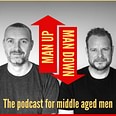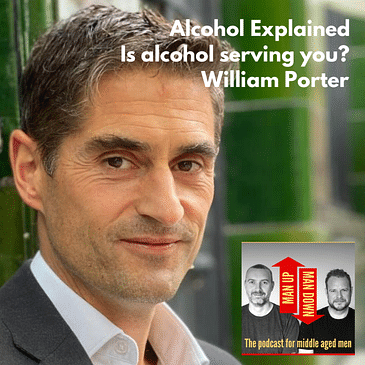In this episode we spoke to William Porter who is the author of Alcohol Explained and other books on addiction. We recorded this episode just before Christmas, when you couldn’t avoid the advertising and association of alcohol to fun and celebration.
Similar to Volker, William started drinking and smoking when he was 14 years old which escalated during his military and law career. But why would you give up drinking if it’s the last vice to hang on to, Volker wondered. However, after reading William’s book, Volker has started to question why would you continue drinking?
William takes a very pragmatic approach in his book and strips away all the myths around alcohol and urges us to ask the question: is alcohol a pleasure and is it serving you?
87% of the population drinks and seems to find it totally normal to consume this drug. Yet, while we should be able to enjoy events, such as Christmas or a birthday, without a drug, many of us don’t or can’t.
We discussed how we would define someone being an alcoholic. Is it someone who needs a drink first thing in the morning or someone who needs a good bender at the weekend? Most people can enjoy alcohol without getting addicted. However you don’t need to be addicted for it to do your body harm,
The physiological effect of alcohol, which is a sedative and a depressant, results in numbing your nerves. It’s a balancing act for the body to keep up a balance of hormones and chemicals which is called homeostasis - but if you introduce alcohol to the body, the balance is out of kilter. When you consume alcohol, the body releases stress hormones.
And if the alcohol wears off, an oversensitivity of the nervous system remains for a period, creating anxiety. You can either wait until the body stabilises itself again, or you have another drink to numb the imbalance….a vicious cycle, creating craving.
Sweating out the alcohol in the gym the next morning doesn’t work. You might feel better after exercising, but that’s because of the hormones released due to exercising, not because you sweat out alcohol. The challenge is that your heart rate is increased after drinking alcohol. Your body’s natural reaction would be to sit down and rest. Instead we go to the gym and increase the heart rate and body temperature, putting more strain and stress on the body. You are actually damaging your body.
Volker can still do a bottle of red at night, but as he mentioned, a nurse told him years ago, that even if you don’t notice the effects as much, it still affects the way you sleep or does damage to your internal organs. It’s physical as well as mental damage that is caused to your body. Not getting good sleep, e.g. deep sleep, or having reduced REM sleep due to alcohol consumption, our brain cannot dream and process things as well. Usually this kicks in about 5 hours after going to sleep, we have an over sensitisation, and therefore we stop sleeping well for the remainder of the night.
David talked about rewards being handed out at charity events being alcohol, despite alcohol being classified as harmful as cigarette smoking or asbestos. William also elaborates on his alcohol problem with him calling in sick on Mondays and sometimes Mondays and Tuesdays. As he was very efficient at his work, he caught up the other days of the week, so never got into trouble. There are many, if not all professions, that drink. And success is often associated with a cigar and a whiskey, treating oneself.
It’s good to see the arrival of alcohol free in pubs and its acceptance, however Volker is missing an alternative for his vice: red wine. Particularly when he puts it into perspective with other things like ‘the armchair’ or ‘the fire’. All of those situations should be enjoyable without alcohol. If we start thinking about it, how can we really be in the moment with our mates or in front of the fire, when drinking alcohol.
To really give up alcohol, we need to change the perception of alcohol. And it takes us a while to get used to alcohol when we first start drinking. So the big question for us remains, does alcohol actually serve us?
If you want to find out more about William Porter, please check out his book Alcohol Explained on Amazon. You also find his other books there.
You can go to his website, www.alcoholexplained.com, where you can read some of the chapters for free.
Did this episode make you think? Did it inspire you to give up alcohol?
What do you think about your alcohol consumption?
Let us know!
Hosted on Acast. See acast.com/privacy for more information.




